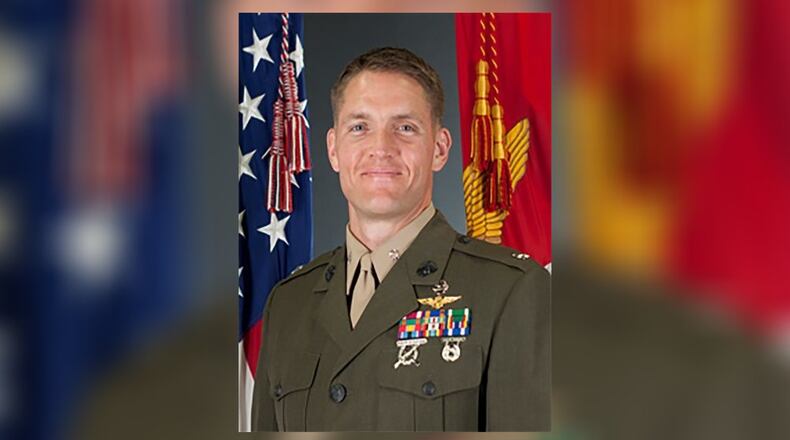Returning from deployment in 2013, Paxton was selected by the Commandant’s Professional Intermediate-Level Education Board to earn a master’s degree in aeronautical engineering from the Air Force Institute of Technology’s Graduate School of Engineering and Management.
Attending AFIT was a humbling experience for Paxton who was nearly 15 years removed from his last college experience.
“I had been outside of the academic environment for quite some time. I definitely learned a lot from the second lieutenants who had just graduated from the Air Force Academy,” Paxton said.
But his operational experience brought a valuable dynamic to his classes where he was able to share how he applied the material to real world scenarios.
“AFIT was positively a full-up, intense academic institution so there had to be quite a bit of time put into purely learning and understanding the material,” said Paxton.
He fondly recalled working on class projects, such as designing small unmanned aircraft systems that could be launched from cargo aircraft as well as taking classes outside his major’s track. One of those classes was “Effects of Nuclear Weapons,” which afforded him the opportunity to travel with the class to Livermore, California and Albuquerque, New Mexico, to visit nuclear weapons laboratories.
Being one of a few Marines in a predominately Air Force school didn’t hinder Paxton. He found a community of other students with whom he shared common experiences to enhance his learning.
“I remember two of the Air Force pilots who were there as part of test pilot school. I appreciated the insights and perspectives they had on flying how their experiences related to the subjects we studied. I interacted with different circles of students to learn from others in addition to assimilating what the instructors provided,” said Paxton.
Following graduation in 2015, Paxton reported to the U.S. Naval Academy where he served as an aerospace engineering instructor.
“I don’t think I would have been able to effectively teach had I not gone to AFIT. Reintroducing those basic fundamentals to me was critical and it also reignited a hunger for learning. It was a huge blessing to bring an academic foundation as well as the operational and leadership experience to the midshipmen,” said Paxton.
“My experiences both at AFIT and teaching at the Naval Academy have been very helpful in formulating my command philosophy and desire to develop the leaders among Marines so they can be competent in their field, courageous in whatever decisions they make, and also compassionate in taking care of other Marines,” said Paxton.
The process of researching and writing his master’s thesis helped to hone his critical thinking and decision-making skills that are vital to his leadership of the squadron.
“Even though it isn’t in the same technical realm, just analyzing all the information at hand and being able to apply it to the situation and make a decision utilizes the same thought processes we employed at AFIT. It has been very helpful because as a commander you need to think beyond the tactical level and understand the repercussions of decisions at the operational and strategic levels,” said Paxton.
The dream of being a military pilot started as early as fourth grade for Paxton when he would draw war scenes with friends. His father told him, “To be a pilot, you have to be an officer and one of the best places to become an officer is a service academy,” recalled Paxton.
He ended up at the U.S. Naval Academy and graduated in 1999 with a Bachelor of Science degree in mechanical engineering.
Originally from Pennsylvania, Paxton is married with six kids, ranging in age from 3 to 14.
“I still utilize some of the specific things I learned at AFIT while teaching my children, specifically when helping my three older children with their math and science. Not only teaching them the fundamentals, but also how to apply it. That has been an unexpected blessing,” said Paxton.
His advice for future AFIT students is to go all in.
“Go for it – do it – I think it is going to be a great experience. But I also say buckle up because you are going to be doing some hard work. And finally, treasure every moment and make the most of it while you are there whether it is talking with instructors, working on your thesis, or doing experiments. There is always the tendency to do well enough to make the grade and move on, or even compete with each other to get the best grade, but embrace the actual learning so that you can take the knowledge and experiences with you wherever you go in order to better serve others,” Paxton said.
About the Author
